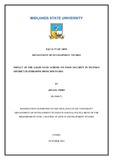Please use this identifier to cite or link to this item:
https://cris.library.msu.ac.zw//handle/11408/2336Full metadata record
| DC Field | Value | Language |
|---|---|---|
| dc.contributor.author | Phiri, Jenara | - |
| dc.date.accessioned | 2017-06-29T13:50:35Z | - |
| dc.date.available | 2017-06-29T13:50:35Z | - |
| dc.date.issued | 2014-10 | - |
| dc.identifier.uri | http://hdl.handle.net/11408/2336 | - |
| dc.description.abstract | The main focus of the research was on the impact of the Grain Loan Scheme on food security in Mutoko district’s wards 18 and 19 which are naturally drought prone areas in the district. The research was aimed at establishing an effective way of managing government funded food aid interventions including identifying and assessing the impacts of Grain Loan Scheme on food security in the district, assessing the capacity of institutions responsible for managing government funded food aid interventions in the district and assessing the coping strategies that are used to manage droughts by the indigenous people themselves as well as those provided by institutions. Food Security was contextualised and conceptualised in this research. The research subscribed to a descriptive approach of doing a research. Simple random and purposive sampling techniques were employed to come up with a total of fifty respondents. Questionnaires with both closed and open ended questions were used to collect data from beneficiaries, local leaders, councilors, GMB officials, the DA’s office, Ministry of Local Government and AGRITEX. The results revealed that the Grain Loan Scheme achieved 80% of its objectives although it faced many challenges. The District Drought Relief Committee lacks resources and proper skill to proactively manage programs and has weak stakeholder engagement mechanisms which exacerbate the inefficiency and ineffectiveness of the institution. Food aid has been found to make people lazy to produce their own food and it has created a sense of dependency in rural communities. The household coping strategies have however been found effective. Recommendations that have been given include that the government should strive to implement sustainable programs that teach people to produce their own food instead of food handouts. Government should subsidize inputs and people should adopt new farming technologies. | en_US |
| dc.language.iso | en | en_US |
| dc.publisher | Midlands State University | en_US |
| dc.subject | Food security | en_US |
| dc.subject | Grain loan scheme | en_US |
| dc.title | Impact of the grain loan scheme on food security in Mutoko District in Zimbabwe from 2010 to 2014. | en_US |
| item.fulltext | With Fulltext | - |
| item.grantfulltext | open | - |
| item.languageiso639-1 | en | - |
| Appears in Collections: | Master Of Arts In Development Studies | |
Page view(s)
114
checked on Jan 1, 2026
Download(s)
112
checked on Jan 1, 2026
Google ScholarTM
Check
Items in MSUIR are protected by copyright, with all rights reserved, unless otherwise indicated.




